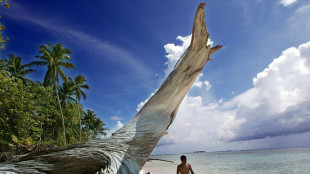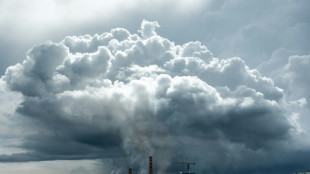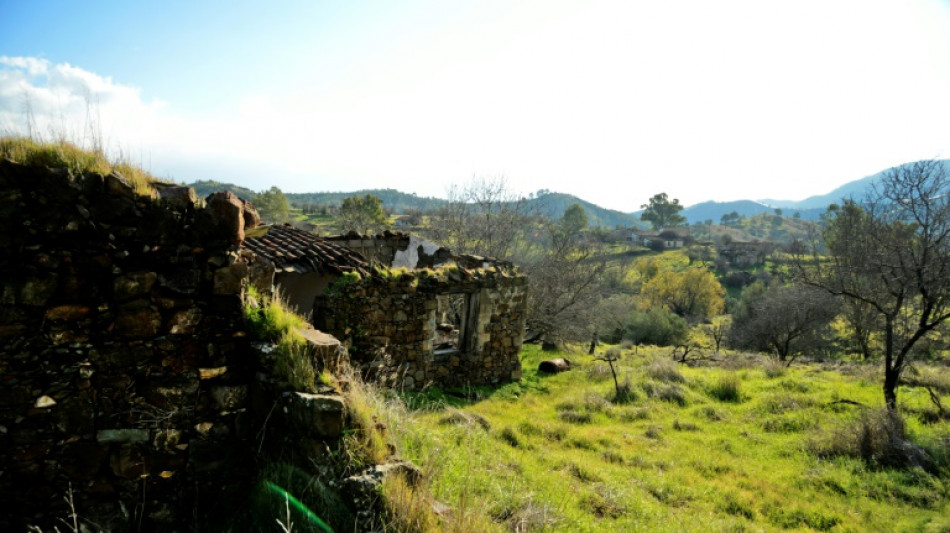
-
 Kenya's Chebet wins 10,000m gold to set up tilt at world double
Kenya's Chebet wins 10,000m gold to set up tilt at world double
-
Lyles, Thompson and Tebogo cruise through world 100m heats

-
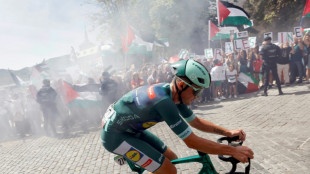 Vuelta final stage shortened amid protest fears
Vuelta final stage shortened amid protest fears
-
Collignon stuns De Minaur as Belgium take Davis Cup lead over Australia

-
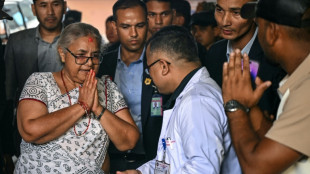 Nepal returns to calm as first woman PM takes charge, visits wounded
Nepal returns to calm as first woman PM takes charge, visits wounded
-
Olympic champion Alfred eases through 100m heats at Tokyo worlds

-
 Winning coach Erasmus 'emotional' at death of former Springboks
Winning coach Erasmus 'emotional' at death of former Springboks
-
Barca's Flick blasts Spain over Yamal injury issue

-
 Rampant Springboks inflict record 43-10 defeat to humble All Blacks
Rampant Springboks inflict record 43-10 defeat to humble All Blacks
-
Italy's Bezzecchi claims San Marino MotoGP pole as Marquez brothers denied
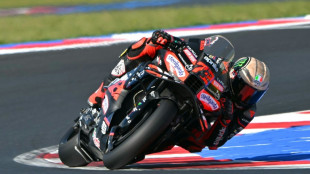
-
 Rampant South Africa inflict record 43-10 defeat on All Blacks
Rampant South Africa inflict record 43-10 defeat on All Blacks
-
Collignon stuns De Minaur as Belgium take 2-0 Davis Cup lead over Australia

-
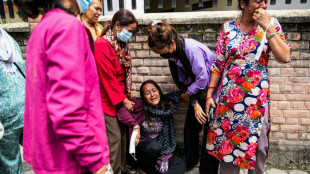 Mourning Nepalis hope protest deaths will bring change
Mourning Nepalis hope protest deaths will bring change
-
Carreras boots Argentina to nervy 28-26 win over Australia

-
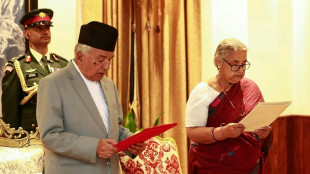 Nepal returns to calm as first woman PM takes charge
Nepal returns to calm as first woman PM takes charge
-
How mowing less lets flowers bloom along Austria's 'Green Belt'
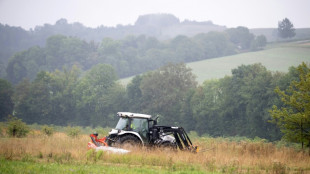
-
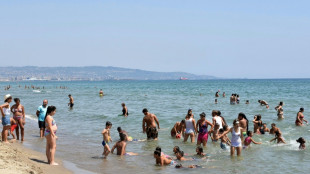 Too hot to study, say Italian teachers as school (finally) resumes
Too hot to study, say Italian teachers as school (finally) resumes
-
Alvarez, Crawford both scale 167.5 pounds for blockbuster bout

-
 Tokyo fans savour athletics worlds four years after Olympic lockout
Tokyo fans savour athletics worlds four years after Olympic lockout
-
Akram tells Pakistan, India to forget noise and 'enjoy' Asia Cup clash
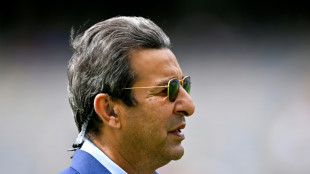
-
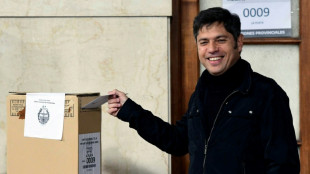 Kicillof, the Argentine governor on a mission to stop Milei
Kicillof, the Argentine governor on a mission to stop Milei
-
Something to get your teeth into: 'Jaws' exhibit marks 50 years

-
 Germany, France, Argentina, Austria on brink of Davis Cup finals
Germany, France, Argentina, Austria on brink of Davis Cup finals
-
War with Russia weighs heavily on Ukrainian medal hope Doroshchuk

-
 Suspect in Charlie Kirk killing caught, widow vows to carry on fight
Suspect in Charlie Kirk killing caught, widow vows to carry on fight
-
Dunfee and Perez claim opening world golds in Tokyo

-
 Ben Griffin leads PGA Procore Championship in Ryder Cup tune-up
Ben Griffin leads PGA Procore Championship in Ryder Cup tune-up
-
'We're more than our pain': Miss Palestine to compete on global stage
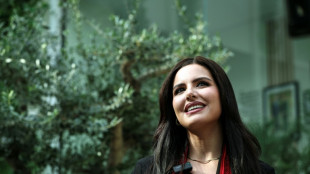
-
 Ingebrigtsen seeks elusive 1500m world gold after injury-plagued season
Ingebrigtsen seeks elusive 1500m world gold after injury-plagued season
-
Thailand's Chanettee leads by two at LPGA Queen City event

-
 Dolphins' Hill says focus is on football amid domestic violence allegations
Dolphins' Hill says focus is on football amid domestic violence allegations
-
Nigerian chef aims for rice hotpot record

-
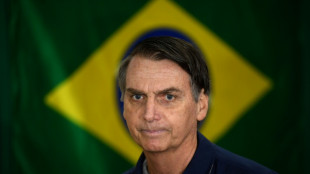 What next for Brazil after Bolsonaro's conviction?
What next for Brazil after Bolsonaro's conviction?
-
Fitch downgrades France's credit rating in new debt battle blow

-
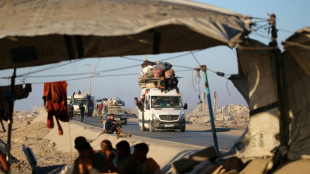 Fifty reported dead in Gaza as Israel steps up attacks on main city
Fifty reported dead in Gaza as Israel steps up attacks on main city
-
Greenwood among scorers as Marseille cruise to four-goal victory

-
 Rodgers calls out 'cowardly' leak amid Celtic civil war
Rodgers calls out 'cowardly' leak amid Celtic civil war
-
Frenchman Fourmaux grabs Chile lead as Tanak breaks down
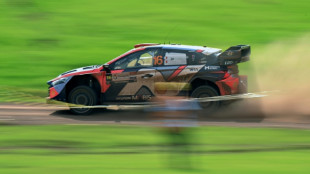
-
 Germany, France, Argentina and Austria on brink of Davis Cup finals
Germany, France, Argentina and Austria on brink of Davis Cup finals
-
New coach sees nine-man Leverkusen beat Frankfurt

-
 US moves to scrap emissions reporting by polluters
US moves to scrap emissions reporting by polluters
-
Matsuyama leads Ryder Cup trio at PGA Championship

-
 US to stop collecting emissions data from polluters
US to stop collecting emissions data from polluters
-
Pope Leo thanks Lampedusans for welcoming migrants
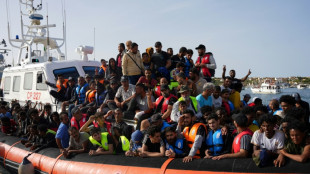
-
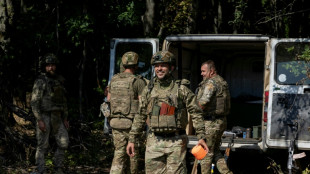 Moscow says Ukraine peace talks frozen as NATO bolsters defences
Moscow says Ukraine peace talks frozen as NATO bolsters defences
-
Salt's rapid ton powers England to record 304-2 against South Africa in 2nd T20

-
 Noah Lyles: from timid school student to track's showman
Noah Lyles: from timid school student to track's showman
-
Boeing defense workers reject deal to end strike

-
 Germany, Argentina close in on Davis Cup finals
Germany, Argentina close in on Davis Cup finals
-
Alvarez, Crawford both tip scales at 167.5 pounds for title bout


Wildlife rebounds in divided Cyprus 'dead zone'
In a long-abandoned village in the UN buffer zone that divides Cyprus, an endangered curly-horned wild sheep offers hope not only for wildlife but that bitter ethnic divisions might slowly be healed.
The mouflon, a majestic breed endemic to the Mediterranean island, is one of many species flourishing in the no-man's-land created when inter-communal strife sliced Cyprus in two in the 1960s.
"Without human influence, the wildlife and plant life have flourished," said Salih Gucel, director of the Institute of Environmental Sciences at Near East University in the breakaway Turkish Cypriot north.
"It is like stepping back in time to what our grandparents would have seen 100 years ago," Gucel said, after spotting an orchid growing amid the tumbled ruins of a farmhouse in the village of Varisha, some 55 kilometres (35 miles) west of the capital Nicosia.
Cyprus has been split since 1974 when Turkish forces occupied the northern part of the island in response to a Greek-sponsored military coup.
The buffer zone covers some three percent of the island, is 180 kilometres (112 miles) long and up to eight kilometres (five miles) wide.
- Rare species 'haven' -
Many call it the "dead zone", a tragic reminder of a frozen conflict where bullet-riddled buildings crumble back into the dust.
Yet it is far from empty.
Farmers with permits can enter, while United Nations peacekeepers patrol the line, monitoring soldiers, watching for smugglers or for refugees hoping to cross.
But it has also become a "haven" for rare plants and animals, a "wildlife corridor" linking otherwise fragmented environments right across the island, said ecologist Iris Charalambidou, from the University of Nicosia.
"It's an area where species can escape intensive human activity," Charalambidou said, noting that there were some 200-300 mouflon in the Variseia area alone, a tenth of the estimated 3,000 population.
"These are areas where biodiversity flourishes... core populations of species that, when populations become larger, disperse to other areas."
Warily watching the rare human visitors, a pair of mouflon peer through an overgrown olive grove, turning tail long before wildlife experts -- accompanied by Argentinian troops of the United Nations peacekeeping force -- come close.
The mouflon, a national symbol once hunted to the brink of extinction, is not the only species thriving here.
Charalambidou said there were also threatened plants including orchids as well as rare reptiles and endangered mammals such as the Cyprus spiny mouse.
The experts said it shows how an embattled environment can recover if given a chance.
"When human activity is not so intense in a certain area, you see that nature recovers," said Charalambidou, a Greek Cypriot from the government-controlled south of the island.
Gucel echoes her comments. "Outside the buffer zone, herbicides have been used... and orchids are picked or the bulbs dug up," he said.
While the respective political leaders remain at loggerheads, the shared wildlife of the island has helped plant the seed of cooperation between the two sides.
"The political situation on the island remains really difficult," said Aleem Siddique, spokesman for the UN peacekeeping force in Cyprus.
"But there is still a lot of peace building work that can be done at the grassroots level."
- 'Common goal' -
That has included a UN-backed project identifying "biodiversity hotspots" inside the buffer zone, bringing scientists from the two communities together.
"One of the aims of our project was to get people who are interested in the environment in both communities to collaborate with each other," Gucel said.
"We have a common goal and a common interest," said Charalambidou, peering at yellow flowers poking through coils of rusting barbed wire.
For many islanders, there is little contact with those from the other side, the two communities apparently increasingly set on different paths and separate futures.
"The more that we can get the two communities working together, the more that we can get them to meet on common issues of concern, and that will benefit not only the environment but also the peace process," Siddique said.
In Cyprus, the history of division is impossible to ignore. On the hilltops above Variseia, soldiers in fortified watchtowers eye each other across the valley.
Below, Gucel and Charalambidou trace a mouflon track through a tangled almond orchard.
"People who work in environmental issues are usually so passionate about it that when they meet, they talk about that, and don't bother talking about other issues," Charalambidou said. "It unites people."
F.Müller--BTB

